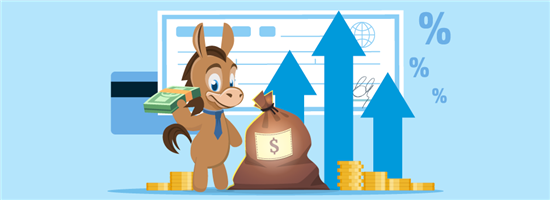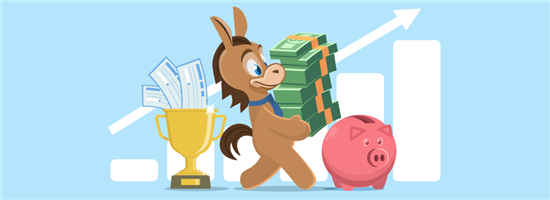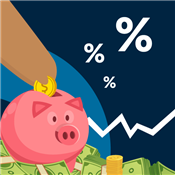Best High Yield Checking Accounts
Ad Disclosure: This article contains references to products from our partners. We may receive compensation if you apply or shop through links in our content. This compensation may impact how and where products appear on this site. You help support CreditDonkey by using our links.
High-yield checking accounts offer rates high enough to rival savings and money market accounts. Discover the top 5 high-yield checking accounts here.
 |
Axos ONE - Earn up to 4.21% APY
- Earn up to 4.21% APY* on savings, and 0.51% APY* on checking when you meet requirements.
- Get your money up to 2 days early.
- No monthly maintenance, minimum balance, account opening, or overdraft fees.
UFB Freedom Checking & Savings - Unlock Up to 3.46% APY
Combine Freedom Checking with Portfolio Savings to boost your savings APY by up to 0.20%.* Fewer fees, faster transactions. Plus, earn 2.00% APY* on your checking account.
When it comes to high-interest banking, most people don't think of checking accounts.
However, some high-yield checking accounts outshine even the best high-yield savings accounts on the market.
Below, review the best rates available, terms and conditions, and qualification requirements so you can make an informed decision before opening your next account.
Yes, these great high yield checking accounts are available for your consideration:
The Top 5 High-Yield Checking Accounts
The below recommendations offer some of the most impressive APYs we've seen in a checking account. Be sure to review all requirements before applying.
Axos ONE - Earn up to 4.21% APY
- Earn up to 4.21% APY* on savings, and 0.51% APY* on checking when you meet requirements.
- Get your money up to 2 days early.
- No monthly maintenance, minimum balance, account opening, or overdraft fees.
UFB Freedom Checking & Savings - Unlock Up to 3.46% APY
Combine Freedom Checking with Portfolio Savings to boost your savings APY by up to 0.20%.* Fewer fees, faster transactions. Plus, earn 2.00% APY* on your checking account.
Liberty FCU Vertical Checking
Liberty Federal Credit Union Vertical Checking offers one of the top rates currently in the nation.
There are hundreds of employers in their field of membership, so it's worth checking out. Or you can also join by donating $5 to Mater Dei Friends & Alumni Association.
The required opening deposit is just $25. To get the top APY, the requirements are surprisingly easy, as detailed below.
Requirements:
- 15 debit purchases per month
- 1 monthly direct deposit
- Log on to online or mobile banking once during the month
- Enroll in e-statements
Axos Bank Rewards Checking
Axos Bank Rewards Checking offers lower rates than the rest of this list. However, it does have other impressive perks that should be attractive to savers.
These include no overdraft or insufficient fund fees, unlimited ATM reimbursements, and the highest maximum balance of any bank on the list.
Rewards Checking - Up to 3.30% APY
- Build your own APY with up to 3.30% APY*
- Zero monthly maintenance fees
- Zero overdraft or NSF fees
- Zero minimum monthly balance reqs
- No initial deposit requirement
- Unlimited domestic ATM fee reimbursements
- Online debit card management
- Simple, 3-step process for direct deposit
Yes. High-yield checking accounts carry no additional risk compared to traditional checking accounts. Each account on this list insures your deposits by the FDIC (for banks) or NCUA (for credit unions) up to $250,000.[1][2]
Devon Bank Kasasa Cash Checking
Chicago-based Devon Bank offers their Kasasa Cash Checking with an APY of 1.50% on balances up to $10,000.
However, members can open a linked Kasasa savings account that earns an additional 0.85% APY on balances up to $50,000 in addition to their checking account interest payments.
Devon Bank also requires zero minimum deposits and has no monthly maintenance fees.
La Capitol FCU Choice Checking
Based in Baton Rouge, Louisiana, La Capitol offers the highest maximum APY on the market with their Choice Checking account.
But there's a catch: a tiered APY system, the lowest of which is slightly above the national average.
Requirements:
- Enroll in e-statements
- 15 debit purchases per month or maintain a $1,000 average daily balance
Consumers Credit Union Serious Interest Checking
CCU potentially offers the best mix between APY and maximum balance with their Rewards Checking.
What Are High-Yield Checking Accounts?
A high-yield checking account is a special type of checking account where you can earn a bit more interest for your balance than most checking accounts with very little if not zero APY.
This type of account is primarily used for everyday money transactions. It provides a convenient and secure way to deposit and withdraw funds.
You can also use it to pay bills, make purchases using a debit card, write checks, and conduct electronic transfers, among other things.
HOW A HIGH-YIELD CHECKING ACCOUNT WORKS
A high-yield checking account works by incentivizing your checking balance with a higher APY.
However, there is generally a cap on the balance to earn a maximum yield. For example, you can get 3% interest for a balance of up to $10,000.
Often, any amount over the cap will still earn interest, albeit much lower. The same goes for those unable to meet the qualifying criteria for the APY.
To maintain a high-yield checking account, you may need to fulfill certain requirements like:
- Keep a higher balance
- Receive a recurring direct deposit
- Make a certain number of purchases using your debit card
It is important to consider the above criteria and evaluate whether you can fulfill them consistently to benefit from the higher interest.
A high-yield checking account is designed for everyday transactions, while a high-yield savings account is intended for savings that can add up over time.
Although both offer higher rates compared to their regular counterparts, the high-yield savings account typically has a higher interest than a high-yield checking account.
WHO IS A HIGH-YIELD CHECKING ACCOUNT FOR?
High-yield checking accounts are great for those who:
- Keep large balances in their checking account
- Are active users, i.e. make frequent electronic or POS transactions
- Live or work where there is a physical branch (for credit unions)
- Don't mind an online account or not having a physical branch
- Have a broader relationship with the bank offering the account
Other things to know about high-yield checking accounts
In reality, most people don't need a lot of money in their checking accounts.
And besides, many high-yield checking accounts have maximum balances. In which case, having a linked high-yield savings account where you can move your excess funds would be preferable.
Remember, a high-yield checking account is often online or available in banks with regional locations. If you don't live where the credit union is based or prefer to make frequent cash deposits, this product may not be the right fit.
Moreover, there is also the temptation to overspend with a checking account since your funds are more accessible.
WHAT IS THE NATIONAL AVERAGE APY?
The National Average APY is 0.07% APY (as of July 2023).[3]. It refers to the average interest rate offered by financial institutions on their high-yield checking accounts across the country.
This rate is a benchmark for comparing the interest rates offered by different banks and credit unions.
Understanding the national average APY helps you assess whether a particular high-yield checking account has a competitive rate compared to the industry standard.
Simply put, any bank offering a rate higher than the national average may be worth exploring.
When does the average rate increase?
There is no regular schedule when the national average APY goes up as it is influenced by many factors, including a federal rate hike and favorable market trends.
Note that the rates can fluctuate as well. But it is a typical reaction for banks and financial institutions to raise their deposit rates when the fed rate increases to improve liquidity.
How to Decide if a High-Yield Checking Account is Right for You
 |
When deciding on the best account for your unique financial situation, you'll want to take into account several factors. These include:
- Do you meet the monthly requirements? Most high-yield checking accounts may require you to make a certain number of debit card purchases and/or have a certain amount in direct deposits per month. Make sure it's reasonable for you to meet these requirements.
- How much do you have saved? While earning a high yield is great, most offer much lower rates once you have a big balance. You may also want to place your additional savings in a high-yield savings account or a long-term investment vehicle like bonds.
- Are you tech-savvy? Many high-yield checking accounts come from online banks or fintech companies. If you are comfortable with online banking, mobile apps, and digital transactions, such an account can provide convenience and earning power.
- Can you link a high-yield savings account? Once you have reached your maximum balance, check if you can transfer funds into a linked high-yield savings account that will still earn considerable interest.
- Are you a disciplined spender? One risk with checking accounts versus savings accounts, CDs, or bonds is the temptation to overspend without the need to transfer funds or have a waiting period before using money with your debit card.
FAQS
What bank pays the highest interest rate on checking accounts?
Credit unions like La Capitol FCU and Liberty FCU are known for offering the highest APY on the checking accounts of their members. Online banks are also another example.
What is a good interest rate for a checking account?
A good checking account interest rate would be near the National Average APY of 0.07% APY (as of July 2023), if not higher. Note that this value may vary from time to time.
Is a high-yield checking account safe?
Yes, a high-yield checking is safe like any other type of financial account insured by the FDIC (for banks) or NCUA (for credit unions). Such government agencies protect deposits up to $250,000 in case the financial institution were to go under.
Is a high-yield checking account worth it?
Yes, a high-yield checking account can be beneficial as long as it aligns with your needs and goals. However, if you find it difficult to keep up with it, you may consider other options with more manageable requirements.
What are the activity requirements for a high-yield checking account?
Activity requirements usually include maintaining higher balances, receiving regular direct deposits, and observing the minimum number of debit card transactions. Note that such conditions will vary among banks.
What if I don't achieve the requirements?
In many cases, you can still keep your checking account even if you don't qualify for their APY. However, you can also expect that your account may earn a lower, if not zero interest and/or pay monthly fees.
Bottom Line
High-yield checking accounts are a little-known deposit option in the financial world where everyday people can somehow grow their balances to keep up with inflation in a low-risk environment.
Axos ONE - Earn up to 4.21% APY
- Earn up to 4.21% APY* on savings, and 0.51% APY* on checking when you meet requirements.
- Get your money up to 2 days early.
- No monthly maintenance, minimum balance, account opening, or overdraft fees.
UFB Freedom Checking & Savings - Unlock Up to 3.46% APY
Combine Freedom Checking with Portfolio Savings to boost your savings APY by up to 0.20%.* Fewer fees, faster transactions. Plus, earn 2.00% APY* on your checking account.
APY rates are variable and can change quickly, so make sure to double-check the current rate before opening an account and read the fine print.
References
- ^ FDIC. Your Insured Deposits, Retrieved 4/27/2022
- ^ NCUA. How Your Accounts are Federally Insured, Retrieved 4/27/2022
- ^ FDIC. National Rates and Rate Caps.
Write to Justin Barnard at feedback@creditdonkey.com. Follow us on Twitter and Facebook for our latest posts.
Note: This website is made possible through financial relationships with some of the products and services mentioned on this site. We may receive compensation if you shop through links in our content. You do not have to use our links, but you help support CreditDonkey if you do.
|
|
|




